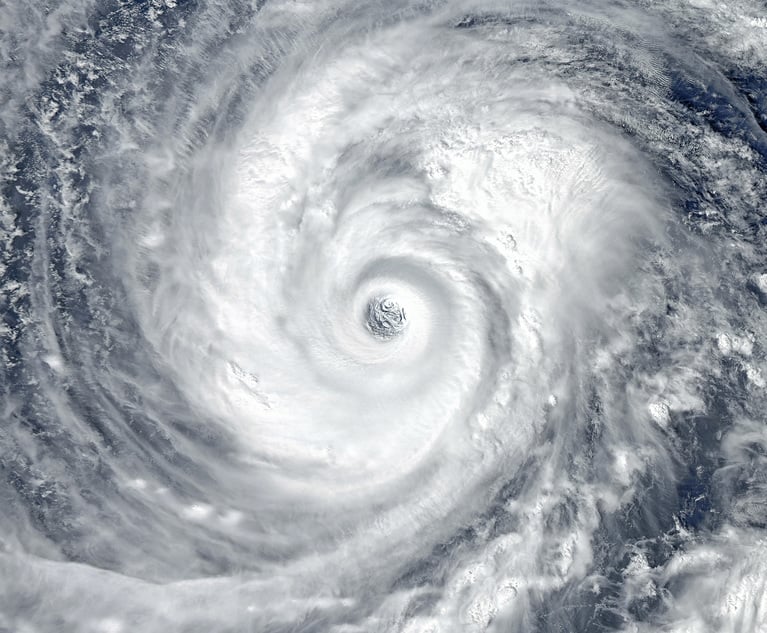Hurricanes Spur Changes In Florida Coverage
|Florida Governor Jeb Bush has signed into law legislationcreating a program to reimburse policyholders who paid multipledeductibles on their homeowners insurance claims in the wake oflast summers string of four hurricanes.
|The measure, House Bill 9A, will fund reimbursements for thosehomeownerscurrently estimated at 36,000through a loan from theFlorida Hurricane Catastrophe Fund. The law also establishes asystem where policyholders will pay one deductible per hurricaneseason rather than after each individual storm.
|The Office of Insurance Regulation is expected to move quicklyto set up a procedure for policyholders to begin applying for thereimbursement of any multiple deductibles paid during thishurricane season, noted Julie Pulliam, a representative with theAmerican Insurance Associations Southeast regional office.“Insurers also will begin the extensive process of implementing thesingle-season deductible for 2005 and beyond,” she said.
|Whether there will be significant rate hikes to offset theincreased exposure of having only one deductible “may very welldepend” on developments this year, said Rey Becker, vice presidentof personal lines for the Property Casualty Insurers Association ofAmerica.
|Should 2005 produce another series of monster hurricanes,insurers might reevaluate their rating processes and the modelsthey use to project losses, he said. Additionally, the statelegislature is planning to reconvene in March, and Mr. Becker notedthat there “may be a desire to tinker further” with deductibleissues.
|However, Mr. Becker also noted that House Bill 9A applies onlyto a homeowners windstorm deductible and that deductibles for othertypes of damage that typically occur during hurricane season willbe unaffected by the law. “Theres still something of a safetyvalve, from the companies perspective,” he said.
|Passage of the legislation represents a victoryif not a completeonefor the industry, which had lobbied to have the program fundedfrom the states general revenue. The industry was successful,however, in moving the burden of administering the program onto theshoulders of the state Department of Financial Services.
|Under the bill, the state Catastrophe Fund will reimburse theaffected policyholders and then make up the expense by collecting arapid cash buildup surcharge along with the premiums insurers arecharged for participating in the fund over the next five yearsanadded cost that will be passed on to consumers.
|While insurers are not administering the program, PCI RegionalManager William Stander said they will be required to cooperatewith the state by providing claims information and to issue noticesto policyholders. However, providing that information shouldnt be aproblem, he said, adding that PCI supported the overall bill andwas pleased with its passage.
|Another aspect of the bill Mr. Stander said was “of concern,although not to the point of troubling,” prohibits insurers fromretroactively changing their deductible policies. Some companies,he noted, had stated early in the hurricane season thatpolicyholders would not be required to pay multiple deductibles andinstead absorbed those costs. Under the law, those carriers arebarred from charging the extra deductibles retroactively, for whichinsureds would have been reimbursed by the state.
|“Its interesting,” Mr. Stander said, “that the legislature choseto incentivise everything thats wrong and disincentivise everythingthats right.”
|Florida lawmakers also announced that a joint committee would beformed to examine property-casualty insurance issues before thestart of the next regular legislative session in March.
|Mr. Stander said several issues the industry is hoping to haveexamined involve sinkholes, building codes and a possible loweringof insurer thresholds before collecting from the HurricaneCatastrophe Fund. For many companies, he noted, no single hurricaneof 2004 caused enough losses to trigger fund payments.
|AIAs Ms. Pulliam also noted that “we expect legislators to lookat an even broader range of public policy issues, including moreconsumer options in terms of deductibles, changes to the HurricaneCatastrophe Fund, and an examination of the state-run CitizensProperty Insurance Corp.”
|In addition, last week the governor and his cabinet againapproved an emergency rule barring insurers from canceling ornon-renewing insurance policies of storm victims whose homes haveyet to be repaired until 60 days after repairs are made. Theemergency rule took effect as of Jan. 1, and is set to expire March31, 2005.
|“Thousands of Floridians still waiting for help to rebuild orrepairs to be done can breathe easier thanks to action we tooktoday,” said state Chief Financial Officer Tom Gallagher, a memberof the cabinet who pushed for the rules adoption. Mr. Gallagheralso lobbied the legislature to make the rule a part of state lawduring the recent special session.
Reproduced from National Underwriter Edition, December 30, 2004.Copyright 2004 by The National Underwriter Company in the serialpublication. All rights reserved.Copyright in this article as anindependent work may be held by the author.
Want to continue reading?
Become a Free PropertyCasualty360 Digital Reader
Your access to unlimited PropertyCasualty360 content isn’t changing.
Once you are an ALM digital member, you’ll receive:
- All PropertyCasualty360.com news coverage, best practices, and in-depth analysis.
- Educational webcasts, resources from industry leaders, and informative newsletters.
- Other award-winning websites including BenefitsPRO.com and ThinkAdvisor.com.
Already have an account? Sign In
© 2024 ALM Global, LLC, All Rights Reserved. Request academic re-use from www.copyright.com. All other uses, submit a request to [email protected]. For more information visit Asset & Logo Licensing.








